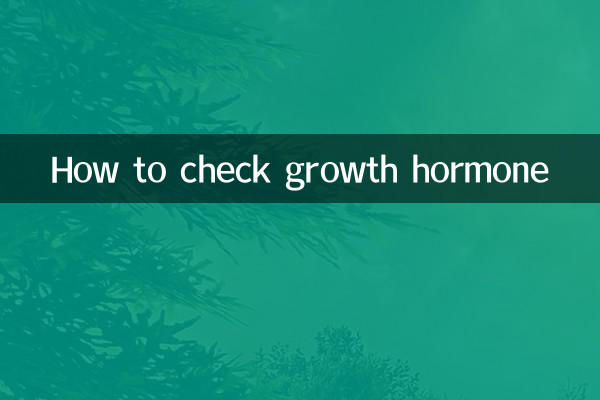How to check growth hormone
Growth hormone (GH) is a key hormone for human growth and development, especially for children's height growth. If abnormal growth hormone secretion is suspected, it needs to be confirmed through professional medical examination. The following is a detailed guide on growth hormone testing, compiled based on the health and medical hot topics in the hot topics on the Internet in the past 10 days.
1. Common methods for growth hormone detection

The detection of growth hormone needs to be combined with clinical symptoms and laboratory tests. The following are the mainstream detection methods:
| Detection method | Description | Applicable people |
|---|---|---|
| Random serum GH testing | A single blood draw measures GH levels, but results are susceptible to day and night fluctuations | initial screening |
| growth hormone challenge test | Collect blood multiple times after drug stimulation to observe the peak secretion of GH | Children/Adults with Suspected GH Deficiency |
| IGF-1 test | Measure insulin-like growth factor 1 levels, reflecting long-term GH secretion status | all ages |
| Pituitary imaging test | MRI or CT to examine pituitary structure | Suspected pituitary gland disease |
2. The whole process of growth hormone stimulation test
Among the medical and health topics in the past 10 days, parents are most concerned about the detailed process of children’s growth hormone testing:
| stage | Operation | Things to note |
|---|---|---|
| preparation period | Fast for more than 8 hours and stop taking drugs that affect GH | Hospitalization is required for monitoring, and children need to be accompanied by their parents |
| Drug stimulation | Oral clonidine or intravenous arginine | Side effects such as hypotension may occur |
| Blood collection stage | Collect blood 30/60/90/120 minutes after administration. | Need to stay still |
| Result judgment | A peak value of >10ng/ml is normal, and a peak value of <5ng/ml indicates deficiency. | Need to be combined with other indicators such as IGF-1 |
3. Answers to hotly discussed questions across the Internet
Based on recent big data on health topics, we have sorted out high-frequency questions:
1. How much does a growth hormone test cost?
The cost of different testing items varies greatly: provocation test is about 800-1500 yuan, IGF-1 testing is 200-400 yuan, and pituitary MRI examination is about 1000-2000 yuan. Medical insurance reimbursement policies vary from place to place.
2. Under what circumstances does growth hormone need to be checked?
Testing is recommended when the annual growth rate of children is less than 5 cm, the height is lower than the 3 percentile for the same age and gender, and adults have symptoms of hypopituitarism (such as fatigue, increased body fat).
3. Are there any risks with growth hormone testing?
Provocation testing may cause symptoms such as temporary hypoglycemia and nausea, but the incidence of serious complications is less than 1%. It needs to be operated under the supervision of a doctor in a professional medical institution.
4. Reference values of growth hormone related data
| age stage | Normal GH level (ng/ml) | IGF-1 reference range (ng/ml) |
|---|---|---|
| Children (3-10 years old) | 0-20 (random) | 50-300 |
| adolescence | 0-30 (random) | 200-600 |
| adult | <5 (Basic) | 100-300 |
5. Precautions for Growth Hormone Testing
1. Avoid strenuous exercise 3 days before the test and ensure adequate sleep.
2. Children should be tested in a professional pediatric endocrinology department.
3. 4-6 hours of inspection time need to be reserved for the provocation test.
4. Test results must be interpreted by an endocrinologist
Recent health topic data show that parents are increasingly concerned about the "risk of growth hormone abuse". Experts remind: Children with normal development do not need to detect GH. The diagnosis of GH deficiency must strictly meet the diagnostic standards, and growth hormone preparations cannot be used blindly.

check the details

check the details